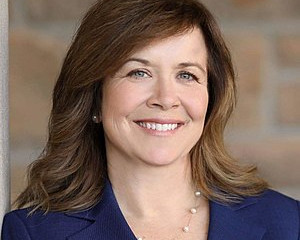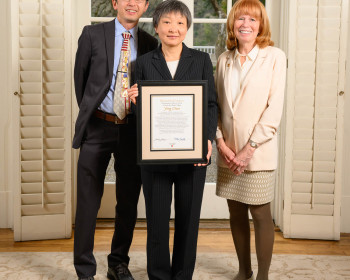Alumni Manage Environmental Resource Issues in Pacific Islands
Open gallery

A number of Lewis & Clark Law School alumni now hold legal positions in Pacific Island nations that give them responsibility over environmental, natural resource, fishery and tourism management. Here are brief reports from four alumni—including several recent graduates—that highlight the nature of their work and explain how their experiences at the law school paved the way for their careers today.
Bubba Cook ’03 is the Western and Central Pacific Tuna Programme Manager at the World Wildlife Fund (WWF) based in New Zealand. He works with national, regional and international fisheries management authorities to develop high level policy strategies and implement technology initiatives in order to advocate for improvements in fishery safety and security and improve conservation efforts.
Cook has co-drafted and refined WWF’s Global Illegal, Unreported, and Unregulated Fishing strategy. He also helped launch WWF’s application of blockchain technology to trace the supply chain of tuna, preventing illegal tuna fishing.
Growing up on the Texas coast of the Gulf of Mexico, Cook spent as much or more time on the water as he did on land. He became interested in fisheries as he witnessed first-hand the impact of unrestrained commercial fisheries and poor fisheries management decisions on the social, cultural, economic, and ecological fabric of the region.
“I was raised with the legends of the ‘silver kings,’ or tarpon of the Brazos River that dignitaries from around the world came to catch as recently as the 1940s. Since then, those silver kings scarcely even exist in what today is considered one of the most polluted rivers in the US,” said Cook.
Cook participated in the Northwest Environmental Defense Center (NEDC) at the law school and credits several professors for having a significant influence on his career path. Through Professor Janet Neuman’s support of his externship with Trustees for Alaska, he was hired for a position with the National Oceanic and Atmospheric Administration (NOAA) Fisheries Service.
“Amy Bushaw and her Lawyers in Society class gave me the confidence and insight to pursue a policy path as opposed to a legal one. Dan Rohlf’s Wildlife Law and Ocean & Coastal Law, of course, offered the foundational knowledge necessary for me to be effective in my early career,” said Cook.
Orion Cruz ’12 recently became the Assistant Attorney General in Palau. In this role he is supporting the Ministry of Natural Resources, Environment and Tourism on legal, policy and regulatory matters related to biosecurity, sustainable tourism and protected areas such as the Palau National Marine Sanctuary.
The protection of marine ecosystems has been one of Cruz’s primary concerns for the past few years, and as a world leader in marine conservation efforts, he states that Palau is a great fit for him.
As Assistant Attorney General, Cruz is primarily writing legal opinions and drafting laws and regulations, including Palau’s first set of tourism regulations. He is also clarifying legal uncertainty surrounding parts of the Palau National Marine Sanctuary Act, looking into ways to reduce Palau’s dependence on food imports and assisting in the creation of an oceanic fisheries management plan.
The professors that had the largest impact on Cruz were Melissa Powers, Erica Lyman, Chris Wold and Nicholas Fromherz.
“The International Environmental Law Program (IELP) was one of the most important parts of my law school experience and it made it clear to me that, if it was possible, I wanted to do work related to international environmental law and policy,” Cruz said. “Without IELP’s Erica Lyman and Chris Wold, my career path could easily have been different.” He notes that Adjunct Professor Fromherz was a valued mentor and gave him the idea to work in Palau.
“If I had gone to a different type of law school, I don’t think I would have ended up being as prepared for the type of work I’m doing.” Cruz said.
Viv Fernandes ’15 is the compliance policy advisor for Pacific Island Forum Fisheries Agency (FFA) based in Honiara, Solomon Islands. He advises FFA’s 17 member countries regarding compliance with national, regional and international fisheries obligations for their respective tuna fisheries regimes.
“I particularly enjoy the extremely diverse nature of my role. It includes a wide range of activities including drafting regional policy documents, supporting member countries at international meetings and negotiations, and delivery training programs across the Pacific,” Fernandes said. “The best part about my job is the amazing opportunity it provides me to have a direct hand in the conservation and management of the Pacific tuna fisheries.”
Fisheries and policy work piqued Fernandes’ interest during his studies in marine science at Sydney University in his home country, Australia. After working as an environmental attorney for a firm in Sydney, he decided he wanted to refocus his career on public interest environmental law and international marine conservation work.
Pursuing an LLM in Environmental and Natural Resources Law at Lewis & Clark Law School provided him with the experience and connections to achieve his career goals.
“My work through IELP directly led me to an externship with the Center for International Environmental Law, and ongoing legal work with World Wildlife Fund (WWF), an IELP client, following my graduation,” Fernandes said. “The LLM spawned work in fisheries law and policy with environmental NGOs, many of which specialized in international fisheries policies throughout the Western and Central Pacific Ocean.”
Doug Hageman ’17 started at his current position as Legal Counsel to the Senate of Palau on June 4, 2018. He completed his undergraduate degree at the American University in Bulgaria, his LLM in International Law at the University of Kent Brussels School of International Studies, and his JD at Lewis & Clark Law School.
While at the law school, Hageman developed indispensable relationships and skills by joining the Jessup International Moot Court team and participating in the International Environmental Law Project (IELP).
“With Jessup, we had to be aware that the judges we would argue in front of came from all over the world, and IELP does work for governments, international organizations, and NGOs around the world as well,” Hageman said. These organizations “not only exposed me to brilliant legal minds from around the world – who, in turn, have become great friends – but helped give me the confidence in my professional abilities to pick my life up and move 6,500 miles away for a job,” he said.
Hageman values the opportunity he had to work with Chris Wold and Erica Lyman. “We’re all decent writers by the time we get to law school, but working with IELP really made me push myself to write better,” he said.
He also credits IELP for introducing him to the possibility of working in Palau. “Palau was never specifically part of my plan, but the one thing I learned fairly early on is that, often, all it takes to have an international career is your first international job – and the quickest way to get that first job is to venture off the beaten path.”
Law Communications is located in room 304 of Legal Research Center (LRC) on the law Campus.
MSC: 51
email jasbury@lclark.edu
voice 503-768-6605
Cell: 626-676-7923
Assistant Dean,
Communications and External Relations, Law School
Judy Asbury
Law Communications
Lewis & Clark Law School
10101 S. Terwilliger Boulevard MSC 51
Portland OR 97219

